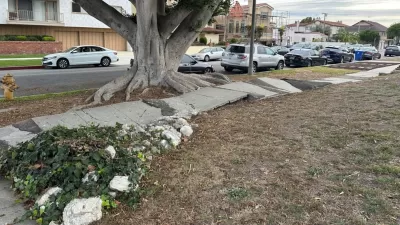Houston is fighting itself on walkability. While some build sidewalks and benches, parking minimums and outdated policies hold the city back.

Leah Binkovitz writes for Urban Edge about Houston's efforts to become more friendly to pedestrians. "Since 2013, the city’s Complete Streets executive order has required the city’s planning and public works departments to prioritize 'public roadways that take into account all users, including people who are driving or riding in cars, using mass transit, riding bikes, walking, using wheelchairs, driving or riding in trucks, driving or being transported by emergency vehicles, and being served at their residence or property by other users.'"
Still, the city has struggled to overcome policies at odds with the push for complete streets. "Things like minimum parking requirements — and no maximum limit — as well as an ongoing conflict with CenterPoint over the placement of utility poles that disrupt sidewalk space for users, particularly for people in wheelchairs or pushing strollers, continue to hamper what Wallace Brown said was the planning department’s commitment to walkability," Binkovitz reports. Parking requirements can be avoided if developers get special dispensation, but the hurdle can stop projects before they start.
FULL STORY: IS A WALKABLE HOUSTON POSSIBLE?

Alabama: Trump Terminates Settlements for Black Communities Harmed By Raw Sewage
Trump deemed the landmark civil rights agreement “illegal DEI and environmental justice policy.”

Planetizen Federal Action Tracker
A weekly monitor of how Trump’s orders and actions are impacting planners and planning in America.

The 120 Year Old Tiny Home Villages That Sheltered San Francisco’s Earthquake Refugees
More than a century ago, San Francisco mobilized to house thousands of residents displaced by the 1906 earthquake. Could their strategy offer a model for the present?

In Both Crashes and Crime, Public Transportation is Far Safer than Driving
Contrary to popular assumptions, public transportation has far lower crash and crime rates than automobile travel. For safer communities, improve and encourage transit travel.

Report: Zoning Reforms Should Complement Nashville’s Ambitious Transit Plan
Without reform, restrictive zoning codes will limit the impact of the city’s planned transit expansion and could exclude some of the residents who depend on transit the most.

Judge Orders Release of Frozen IRA, IIJA Funding
The decision is a victory for environmental groups who charged that freezing funds for critical infrastructure and disaster response programs caused “real and irreparable harm” to communities.
Urban Design for Planners 1: Software Tools
This six-course series explores essential urban design concepts using open source software and equips planners with the tools they need to participate fully in the urban design process.
Planning for Universal Design
Learn the tools for implementing Universal Design in planning regulations.
Clanton & Associates, Inc.
Jessamine County Fiscal Court
Institute for Housing and Urban Development Studies (IHS)
City of Grandview
Harvard GSD Executive Education
Toledo-Lucas County Plan Commissions
Salt Lake City
NYU Wagner Graduate School of Public Service





























